Critical Thinking Guide: Chapters 1-9 Report - Analysis and Summary
VerifiedAdded on 2022/10/06
|21
|4990
|16
Report
AI Summary
This report provides a comprehensive overview of the first nine chapters of 'Beyond Feelings: A Guide to Critical Thinking.' It begins by exploring the influence of place and time on individual perspectives, the impact of advertising, and the importance of maintaining principles. The report then delves into the definition of critical thinking, differentiating it from plain thinking and highlighting the characteristics of effective critical thinkers. It examines the concept of truth, distinguishing between truth with a capital 'T' and the fallibility of human perception and memory. Furthermore, the report discusses knowledge acquisition, contrasting passive and active learning, and exploring the relationship between knowledge, faith, and religion. It also analyzes opinion formation, the role of consequences, and the types of evidence used in critical thinking. The report provides a framework for understanding arguments, including common errors in reasoning, and explores the 'mine-is-better' perspective, including egocentric and ethnocentric biases. Finally, the report discusses perspective errors and their impact on evaluating issues and forming judgments.
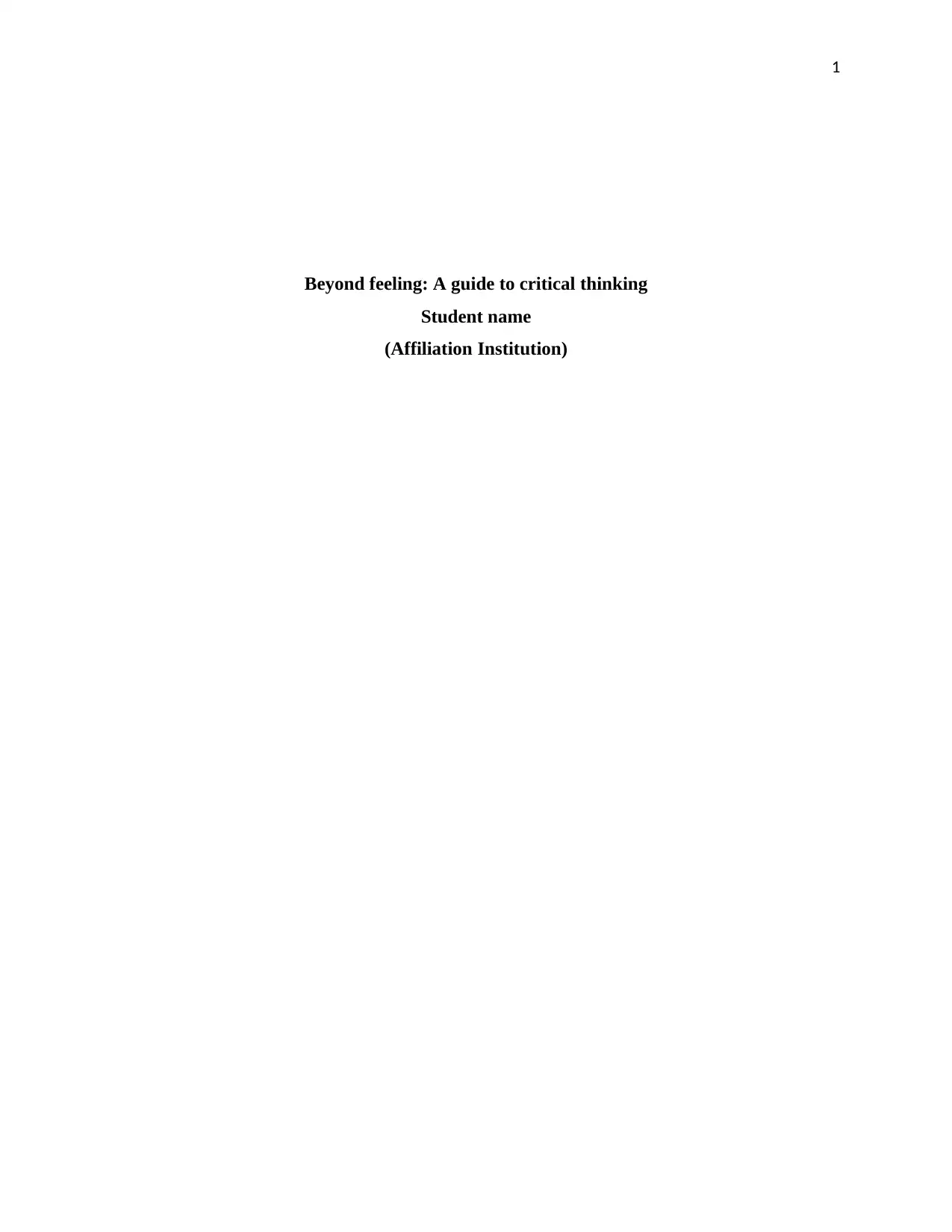
1
Beyond feeling: A guide to critical thinking
Student name
(Affiliation Institution)
Beyond feeling: A guide to critical thinking
Student name
(Affiliation Institution)
Paraphrase This Document
Need a fresh take? Get an instant paraphrase of this document with our AI Paraphraser
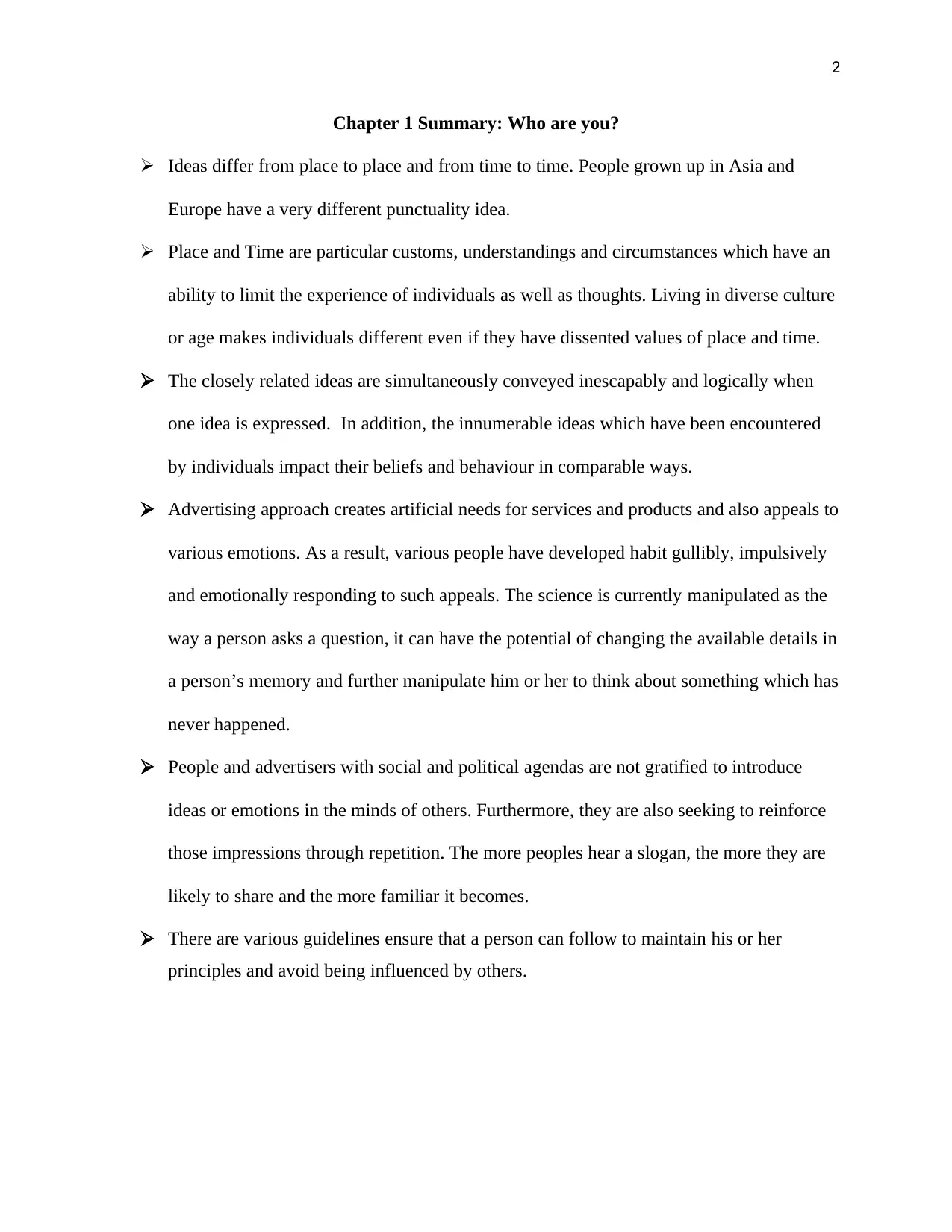
2
Chapter 1 Summary: Who are you?
Ideas differ from place to place and from time to time. People grown up in Asia and
Europe have a very different punctuality idea.
Place and Time are particular customs, understandings and circumstances which have an
ability to limit the experience of individuals as well as thoughts. Living in diverse culture
or age makes individuals different even if they have dissented values of place and time.
The closely related ideas are simultaneously conveyed inescapably and logically when
one idea is expressed. In addition, the innumerable ideas which have been encountered
by individuals impact their beliefs and behaviour in comparable ways.
Advertising approach creates artificial needs for services and products and also appeals to
various emotions. As a result, various people have developed habit gullibly, impulsively
and emotionally responding to such appeals. The science is currently manipulated as the
way a person asks a question, it can have the potential of changing the available details in
a person’s memory and further manipulate him or her to think about something which has
never happened.
People and advertisers with social and political agendas are not gratified to introduce
ideas or emotions in the minds of others. Furthermore, they are also seeking to reinforce
those impressions through repetition. The more peoples hear a slogan, the more they are
likely to share and the more familiar it becomes.
There are various guidelines ensure that a person can follow to maintain his or her
principles and avoid being influenced by others.
Chapter 1 Summary: Who are you?
Ideas differ from place to place and from time to time. People grown up in Asia and
Europe have a very different punctuality idea.
Place and Time are particular customs, understandings and circumstances which have an
ability to limit the experience of individuals as well as thoughts. Living in diverse culture
or age makes individuals different even if they have dissented values of place and time.
The closely related ideas are simultaneously conveyed inescapably and logically when
one idea is expressed. In addition, the innumerable ideas which have been encountered
by individuals impact their beliefs and behaviour in comparable ways.
Advertising approach creates artificial needs for services and products and also appeals to
various emotions. As a result, various people have developed habit gullibly, impulsively
and emotionally responding to such appeals. The science is currently manipulated as the
way a person asks a question, it can have the potential of changing the available details in
a person’s memory and further manipulate him or her to think about something which has
never happened.
People and advertisers with social and political agendas are not gratified to introduce
ideas or emotions in the minds of others. Furthermore, they are also seeking to reinforce
those impressions through repetition. The more peoples hear a slogan, the more they are
likely to share and the more familiar it becomes.
There are various guidelines ensure that a person can follow to maintain his or her
principles and avoid being influenced by others.
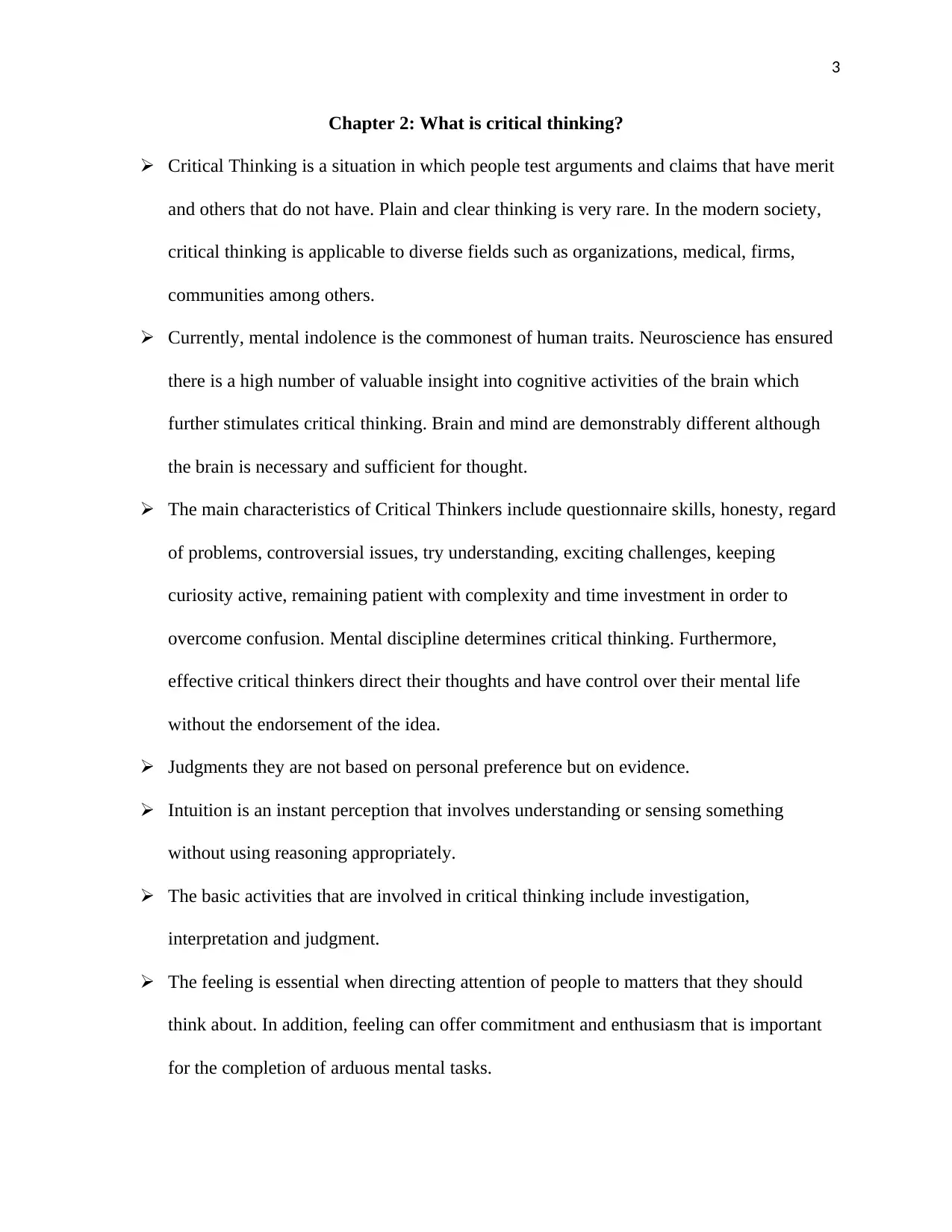
3
Chapter 2: What is critical thinking?
Critical Thinking is a situation in which people test arguments and claims that have merit
and others that do not have. Plain and clear thinking is very rare. In the modern society,
critical thinking is applicable to diverse fields such as organizations, medical, firms,
communities among others.
Currently, mental indolence is the commonest of human traits. Neuroscience has ensured
there is a high number of valuable insight into cognitive activities of the brain which
further stimulates critical thinking. Brain and mind are demonstrably different although
the brain is necessary and sufficient for thought.
The main characteristics of Critical Thinkers include questionnaire skills, honesty, regard
of problems, controversial issues, try understanding, exciting challenges, keeping
curiosity active, remaining patient with complexity and time investment in order to
overcome confusion. Mental discipline determines critical thinking. Furthermore,
effective critical thinkers direct their thoughts and have control over their mental life
without the endorsement of the idea.
Judgments they are not based on personal preference but on evidence.
Intuition is an instant perception that involves understanding or sensing something
without using reasoning appropriately.
The basic activities that are involved in critical thinking include investigation,
interpretation and judgment.
The feeling is essential when directing attention of people to matters that they should
think about. In addition, feeling can offer commitment and enthusiasm that is important
for the completion of arduous mental tasks.
Chapter 2: What is critical thinking?
Critical Thinking is a situation in which people test arguments and claims that have merit
and others that do not have. Plain and clear thinking is very rare. In the modern society,
critical thinking is applicable to diverse fields such as organizations, medical, firms,
communities among others.
Currently, mental indolence is the commonest of human traits. Neuroscience has ensured
there is a high number of valuable insight into cognitive activities of the brain which
further stimulates critical thinking. Brain and mind are demonstrably different although
the brain is necessary and sufficient for thought.
The main characteristics of Critical Thinkers include questionnaire skills, honesty, regard
of problems, controversial issues, try understanding, exciting challenges, keeping
curiosity active, remaining patient with complexity and time investment in order to
overcome confusion. Mental discipline determines critical thinking. Furthermore,
effective critical thinkers direct their thoughts and have control over their mental life
without the endorsement of the idea.
Judgments they are not based on personal preference but on evidence.
Intuition is an instant perception that involves understanding or sensing something
without using reasoning appropriately.
The basic activities that are involved in critical thinking include investigation,
interpretation and judgment.
The feeling is essential when directing attention of people to matters that they should
think about. In addition, feeling can offer commitment and enthusiasm that is important
for the completion of arduous mental tasks.
⊘ This is a preview!⊘
Do you want full access?
Subscribe today to unlock all pages.

Trusted by 1+ million students worldwide
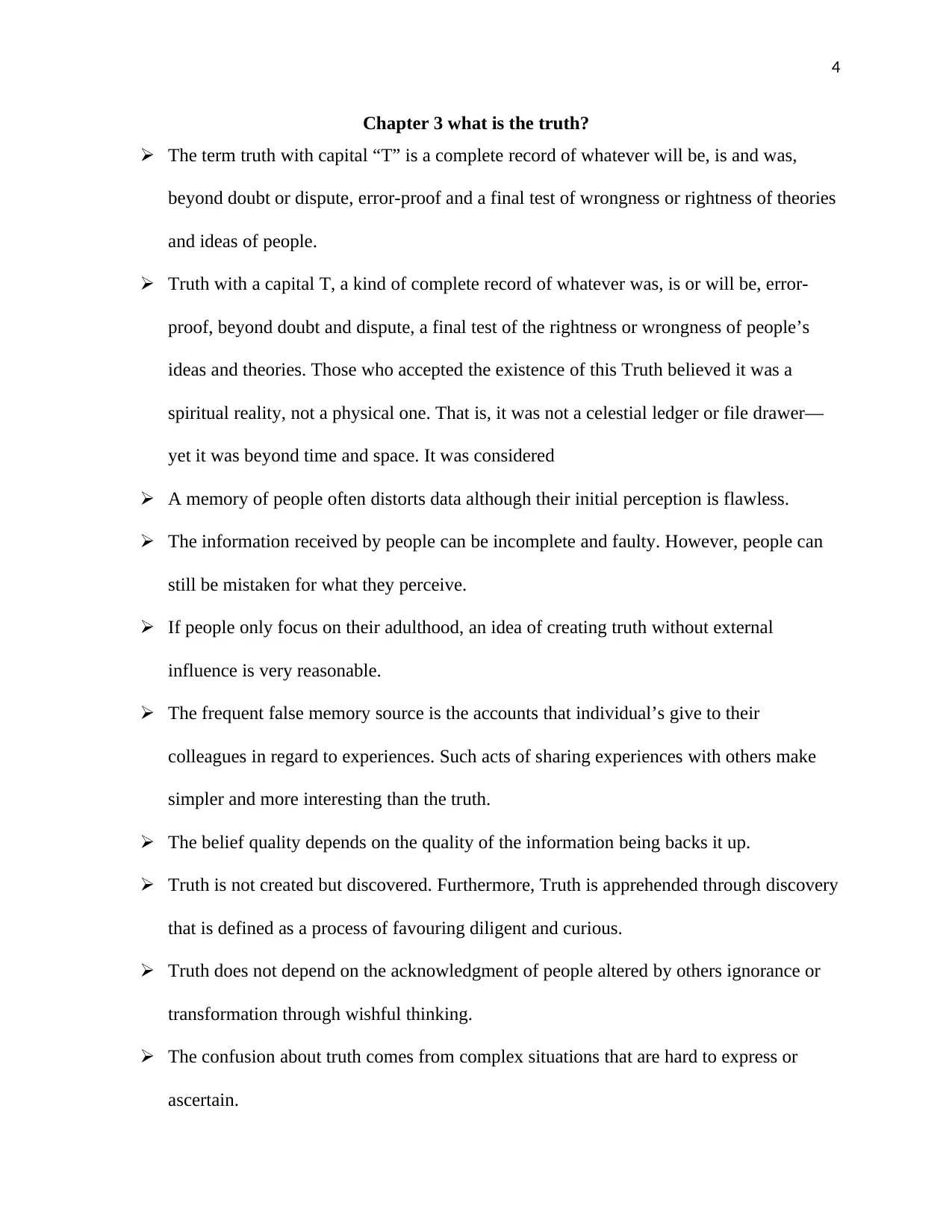
4
Chapter 3 what is the truth?
The term truth with capital “T” is a complete record of whatever will be, is and was,
beyond doubt or dispute, error-proof and a final test of wrongness or rightness of theories
and ideas of people.
Truth with a capital T, a kind of complete record of whatever was, is or will be, error-
proof, beyond doubt and dispute, a final test of the rightness or wrongness of people’s
ideas and theories. Those who accepted the existence of this Truth believed it was a
spiritual reality, not a physical one. That is, it was not a celestial ledger or file drawer—
yet it was beyond time and space. It was considered
A memory of people often distorts data although their initial perception is flawless.
The information received by people can be incomplete and faulty. However, people can
still be mistaken for what they perceive.
If people only focus on their adulthood, an idea of creating truth without external
influence is very reasonable.
The frequent false memory source is the accounts that individual’s give to their
colleagues in regard to experiences. Such acts of sharing experiences with others make
simpler and more interesting than the truth.
The belief quality depends on the quality of the information being backs it up.
Truth is not created but discovered. Furthermore, Truth is apprehended through discovery
that is defined as a process of favouring diligent and curious.
Truth does not depend on the acknowledgment of people altered by others ignorance or
transformation through wishful thinking.
The confusion about truth comes from complex situations that are hard to express or
ascertain.
Chapter 3 what is the truth?
The term truth with capital “T” is a complete record of whatever will be, is and was,
beyond doubt or dispute, error-proof and a final test of wrongness or rightness of theories
and ideas of people.
Truth with a capital T, a kind of complete record of whatever was, is or will be, error-
proof, beyond doubt and dispute, a final test of the rightness or wrongness of people’s
ideas and theories. Those who accepted the existence of this Truth believed it was a
spiritual reality, not a physical one. That is, it was not a celestial ledger or file drawer—
yet it was beyond time and space. It was considered
A memory of people often distorts data although their initial perception is flawless.
The information received by people can be incomplete and faulty. However, people can
still be mistaken for what they perceive.
If people only focus on their adulthood, an idea of creating truth without external
influence is very reasonable.
The frequent false memory source is the accounts that individual’s give to their
colleagues in regard to experiences. Such acts of sharing experiences with others make
simpler and more interesting than the truth.
The belief quality depends on the quality of the information being backs it up.
Truth is not created but discovered. Furthermore, Truth is apprehended through discovery
that is defined as a process of favouring diligent and curious.
Truth does not depend on the acknowledgment of people altered by others ignorance or
transformation through wishful thinking.
The confusion about truth comes from complex situations that are hard to express or
ascertain.
Paraphrase This Document
Need a fresh take? Get an instant paraphrase of this document with our AI Paraphraser
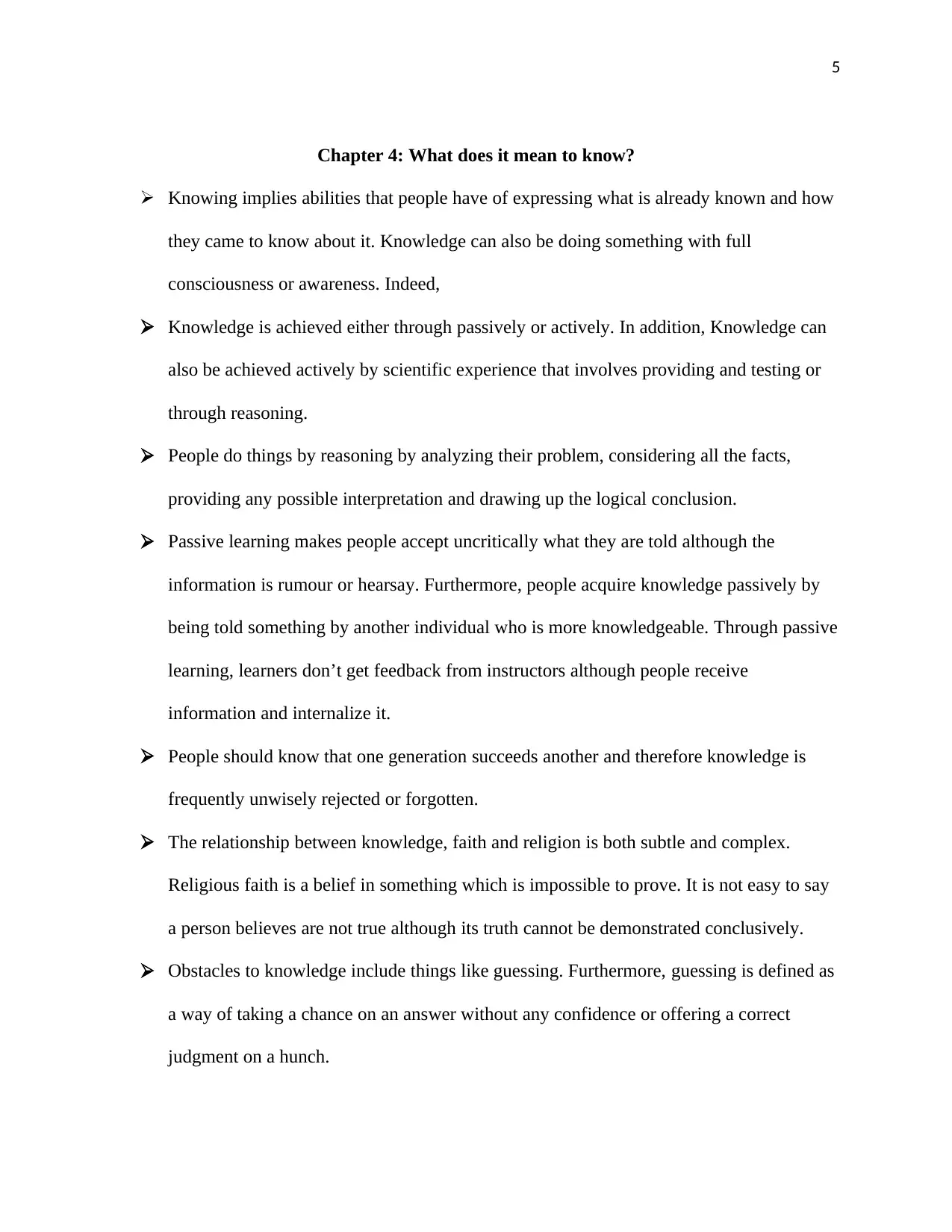
5
Chapter 4: What does it mean to know?
Knowing implies abilities that people have of expressing what is already known and how
they came to know about it. Knowledge can also be doing something with full
consciousness or awareness. Indeed,
Knowledge is achieved either through passively or actively. In addition, Knowledge can
also be achieved actively by scientific experience that involves providing and testing or
through reasoning.
People do things by reasoning by analyzing their problem, considering all the facts,
providing any possible interpretation and drawing up the logical conclusion.
Passive learning makes people accept uncritically what they are told although the
information is rumour or hearsay. Furthermore, people acquire knowledge passively by
being told something by another individual who is more knowledgeable. Through passive
learning, learners don’t get feedback from instructors although people receive
information and internalize it.
People should know that one generation succeeds another and therefore knowledge is
frequently unwisely rejected or forgotten.
The relationship between knowledge, faith and religion is both subtle and complex.
Religious faith is a belief in something which is impossible to prove. It is not easy to say
a person believes are not true although its truth cannot be demonstrated conclusively.
Obstacles to knowledge include things like guessing. Furthermore, guessing is defined as
a way of taking a chance on an answer without any confidence or offering a correct
judgment on a hunch.
Chapter 4: What does it mean to know?
Knowing implies abilities that people have of expressing what is already known and how
they came to know about it. Knowledge can also be doing something with full
consciousness or awareness. Indeed,
Knowledge is achieved either through passively or actively. In addition, Knowledge can
also be achieved actively by scientific experience that involves providing and testing or
through reasoning.
People do things by reasoning by analyzing their problem, considering all the facts,
providing any possible interpretation and drawing up the logical conclusion.
Passive learning makes people accept uncritically what they are told although the
information is rumour or hearsay. Furthermore, people acquire knowledge passively by
being told something by another individual who is more knowledgeable. Through passive
learning, learners don’t get feedback from instructors although people receive
information and internalize it.
People should know that one generation succeeds another and therefore knowledge is
frequently unwisely rejected or forgotten.
The relationship between knowledge, faith and religion is both subtle and complex.
Religious faith is a belief in something which is impossible to prove. It is not easy to say
a person believes are not true although its truth cannot be demonstrated conclusively.
Obstacles to knowledge include things like guessing. Furthermore, guessing is defined as
a way of taking a chance on an answer without any confidence or offering a correct
judgment on a hunch.
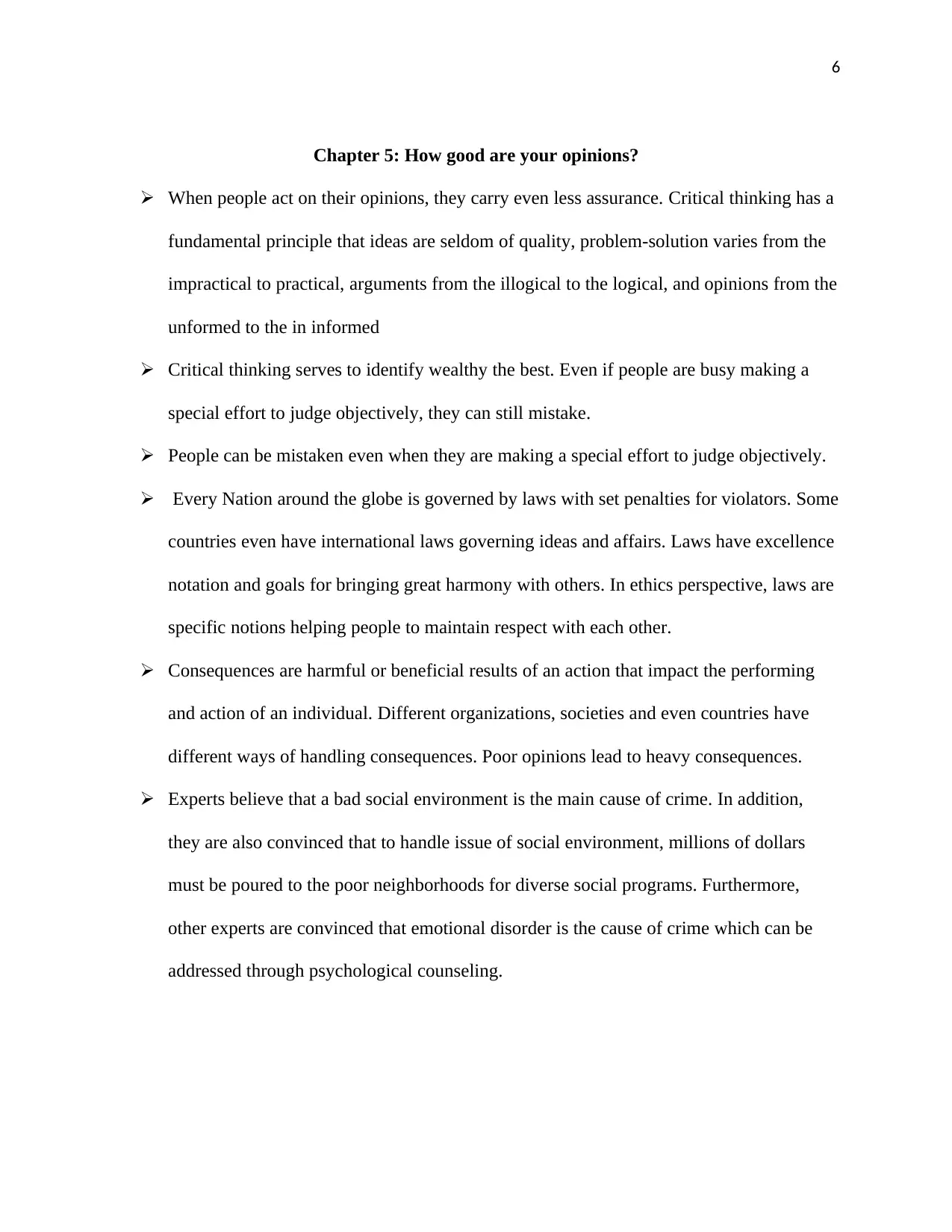
6
Chapter 5: How good are your opinions?
When people act on their opinions, they carry even less assurance. Critical thinking has a
fundamental principle that ideas are seldom of quality, problem-solution varies from the
impractical to practical, arguments from the illogical to the logical, and opinions from the
unformed to the in informed
Critical thinking serves to identify wealthy the best. Even if people are busy making a
special effort to judge objectively, they can still mistake.
People can be mistaken even when they are making a special effort to judge objectively.
Every Nation around the globe is governed by laws with set penalties for violators. Some
countries even have international laws governing ideas and affairs. Laws have excellence
notation and goals for bringing great harmony with others. In ethics perspective, laws are
specific notions helping people to maintain respect with each other.
Consequences are harmful or beneficial results of an action that impact the performing
and action of an individual. Different organizations, societies and even countries have
different ways of handling consequences. Poor opinions lead to heavy consequences.
Experts believe that a bad social environment is the main cause of crime. In addition,
they are also convinced that to handle issue of social environment, millions of dollars
must be poured to the poor neighborhoods for diverse social programs. Furthermore,
other experts are convinced that emotional disorder is the cause of crime which can be
addressed through psychological counseling.
Chapter 5: How good are your opinions?
When people act on their opinions, they carry even less assurance. Critical thinking has a
fundamental principle that ideas are seldom of quality, problem-solution varies from the
impractical to practical, arguments from the illogical to the logical, and opinions from the
unformed to the in informed
Critical thinking serves to identify wealthy the best. Even if people are busy making a
special effort to judge objectively, they can still mistake.
People can be mistaken even when they are making a special effort to judge objectively.
Every Nation around the globe is governed by laws with set penalties for violators. Some
countries even have international laws governing ideas and affairs. Laws have excellence
notation and goals for bringing great harmony with others. In ethics perspective, laws are
specific notions helping people to maintain respect with each other.
Consequences are harmful or beneficial results of an action that impact the performing
and action of an individual. Different organizations, societies and even countries have
different ways of handling consequences. Poor opinions lead to heavy consequences.
Experts believe that a bad social environment is the main cause of crime. In addition,
they are also convinced that to handle issue of social environment, millions of dollars
must be poured to the poor neighborhoods for diverse social programs. Furthermore,
other experts are convinced that emotional disorder is the cause of crime which can be
addressed through psychological counseling.
⊘ This is a preview!⊘
Do you want full access?
Subscribe today to unlock all pages.

Trusted by 1+ million students worldwide
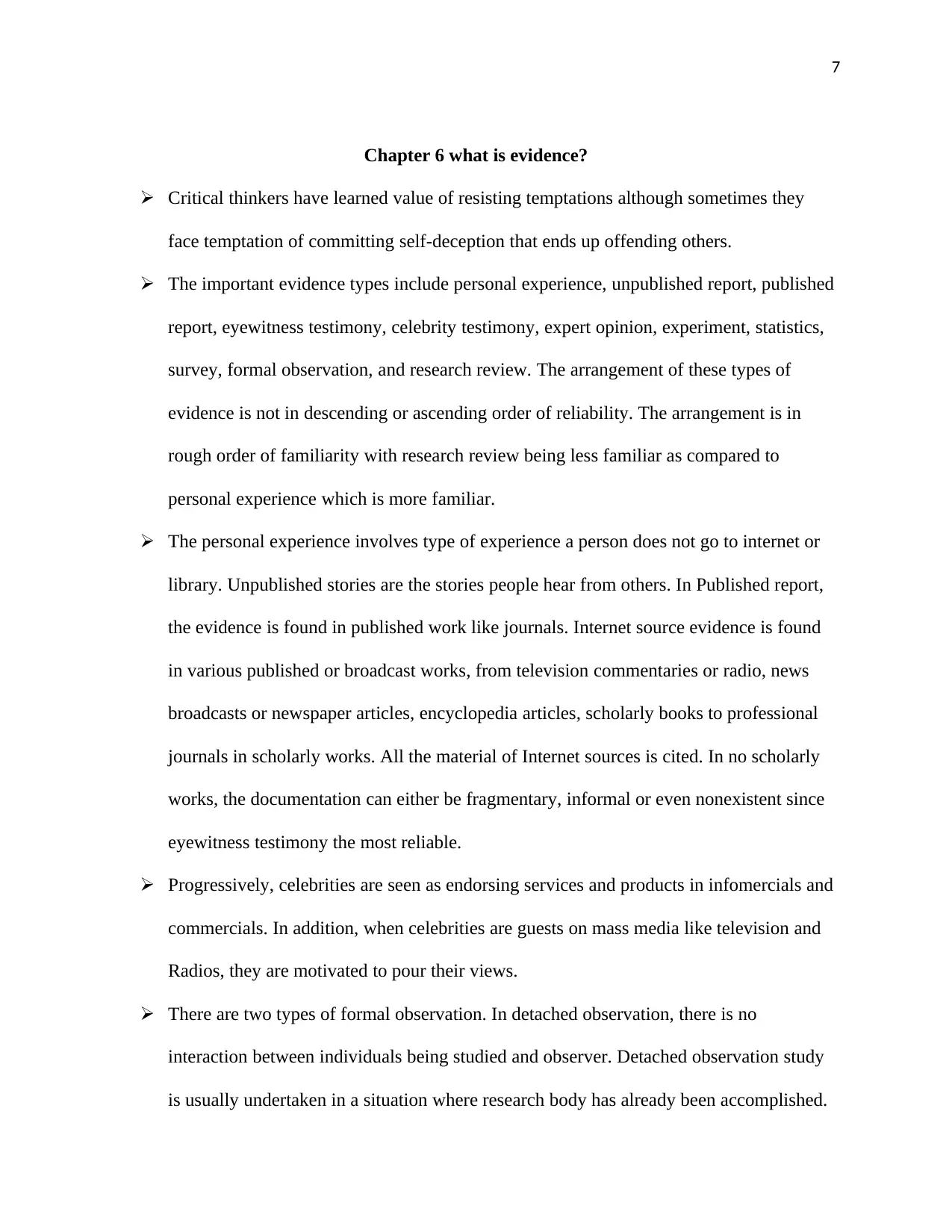
7
Chapter 6 what is evidence?
Critical thinkers have learned value of resisting temptations although sometimes they
face temptation of committing self-deception that ends up offending others.
The important evidence types include personal experience, unpublished report, published
report, eyewitness testimony, celebrity testimony, expert opinion, experiment, statistics,
survey, formal observation, and research review. The arrangement of these types of
evidence is not in descending or ascending order of reliability. The arrangement is in
rough order of familiarity with research review being less familiar as compared to
personal experience which is more familiar.
The personal experience involves type of experience a person does not go to internet or
library. Unpublished stories are the stories people hear from others. In Published report,
the evidence is found in published work like journals. Internet source evidence is found
in various published or broadcast works, from television commentaries or radio, news
broadcasts or newspaper articles, encyclopedia articles, scholarly books to professional
journals in scholarly works. All the material of Internet sources is cited. In no scholarly
works, the documentation can either be fragmentary, informal or even nonexistent since
eyewitness testimony the most reliable.
Progressively, celebrities are seen as endorsing services and products in infomercials and
commercials. In addition, when celebrities are guests on mass media like television and
Radios, they are motivated to pour their views.
There are two types of formal observation. In detached observation, there is no
interaction between individuals being studied and observer. Detached observation study
is usually undertaken in a situation where research body has already been accomplished.
Chapter 6 what is evidence?
Critical thinkers have learned value of resisting temptations although sometimes they
face temptation of committing self-deception that ends up offending others.
The important evidence types include personal experience, unpublished report, published
report, eyewitness testimony, celebrity testimony, expert opinion, experiment, statistics,
survey, formal observation, and research review. The arrangement of these types of
evidence is not in descending or ascending order of reliability. The arrangement is in
rough order of familiarity with research review being less familiar as compared to
personal experience which is more familiar.
The personal experience involves type of experience a person does not go to internet or
library. Unpublished stories are the stories people hear from others. In Published report,
the evidence is found in published work like journals. Internet source evidence is found
in various published or broadcast works, from television commentaries or radio, news
broadcasts or newspaper articles, encyclopedia articles, scholarly books to professional
journals in scholarly works. All the material of Internet sources is cited. In no scholarly
works, the documentation can either be fragmentary, informal or even nonexistent since
eyewitness testimony the most reliable.
Progressively, celebrities are seen as endorsing services and products in infomercials and
commercials. In addition, when celebrities are guests on mass media like television and
Radios, they are motivated to pour their views.
There are two types of formal observation. In detached observation, there is no
interaction between individuals being studied and observer. Detached observation study
is usually undertaken in a situation where research body has already been accomplished.
Paraphrase This Document
Need a fresh take? Get an instant paraphrase of this document with our AI Paraphraser
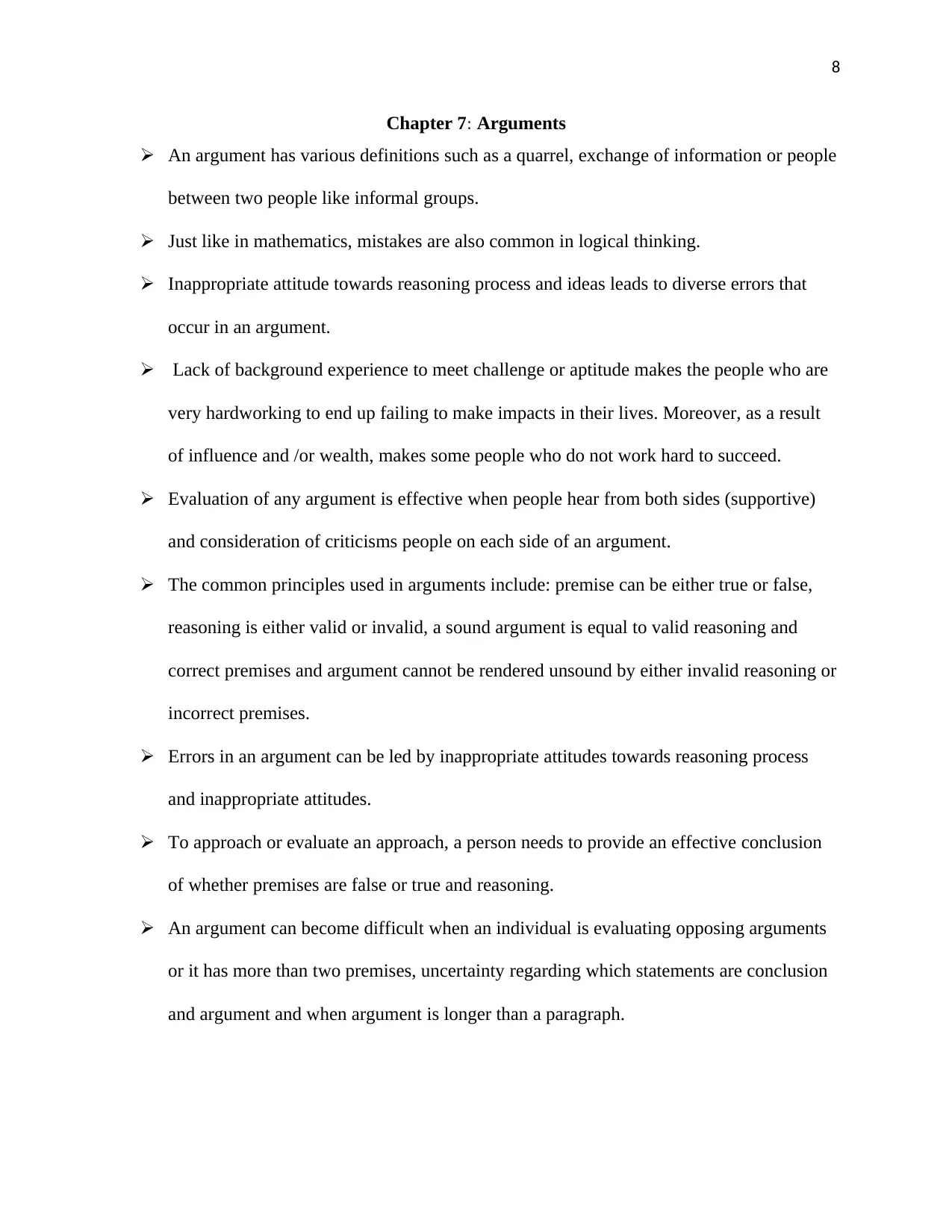
8
Chapter 7: Arguments
An argument has various definitions such as a quarrel, exchange of information or people
between two people like informal groups.
Just like in mathematics, mistakes are also common in logical thinking.
Inappropriate attitude towards reasoning process and ideas leads to diverse errors that
occur in an argument.
Lack of background experience to meet challenge or aptitude makes the people who are
very hardworking to end up failing to make impacts in their lives. Moreover, as a result
of influence and /or wealth, makes some people who do not work hard to succeed.
Evaluation of any argument is effective when people hear from both sides (supportive)
and consideration of criticisms people on each side of an argument.
The common principles used in arguments include: premise can be either true or false,
reasoning is either valid or invalid, a sound argument is equal to valid reasoning and
correct premises and argument cannot be rendered unsound by either invalid reasoning or
incorrect premises.
Errors in an argument can be led by inappropriate attitudes towards reasoning process
and inappropriate attitudes.
To approach or evaluate an approach, a person needs to provide an effective conclusion
of whether premises are false or true and reasoning.
An argument can become difficult when an individual is evaluating opposing arguments
or it has more than two premises, uncertainty regarding which statements are conclusion
and argument and when argument is longer than a paragraph.
Chapter 7: Arguments
An argument has various definitions such as a quarrel, exchange of information or people
between two people like informal groups.
Just like in mathematics, mistakes are also common in logical thinking.
Inappropriate attitude towards reasoning process and ideas leads to diverse errors that
occur in an argument.
Lack of background experience to meet challenge or aptitude makes the people who are
very hardworking to end up failing to make impacts in their lives. Moreover, as a result
of influence and /or wealth, makes some people who do not work hard to succeed.
Evaluation of any argument is effective when people hear from both sides (supportive)
and consideration of criticisms people on each side of an argument.
The common principles used in arguments include: premise can be either true or false,
reasoning is either valid or invalid, a sound argument is equal to valid reasoning and
correct premises and argument cannot be rendered unsound by either invalid reasoning or
incorrect premises.
Errors in an argument can be led by inappropriate attitudes towards reasoning process
and inappropriate attitudes.
To approach or evaluate an approach, a person needs to provide an effective conclusion
of whether premises are false or true and reasoning.
An argument can become difficult when an individual is evaluating opposing arguments
or it has more than two premises, uncertainty regarding which statements are conclusion
and argument and when argument is longer than a paragraph.
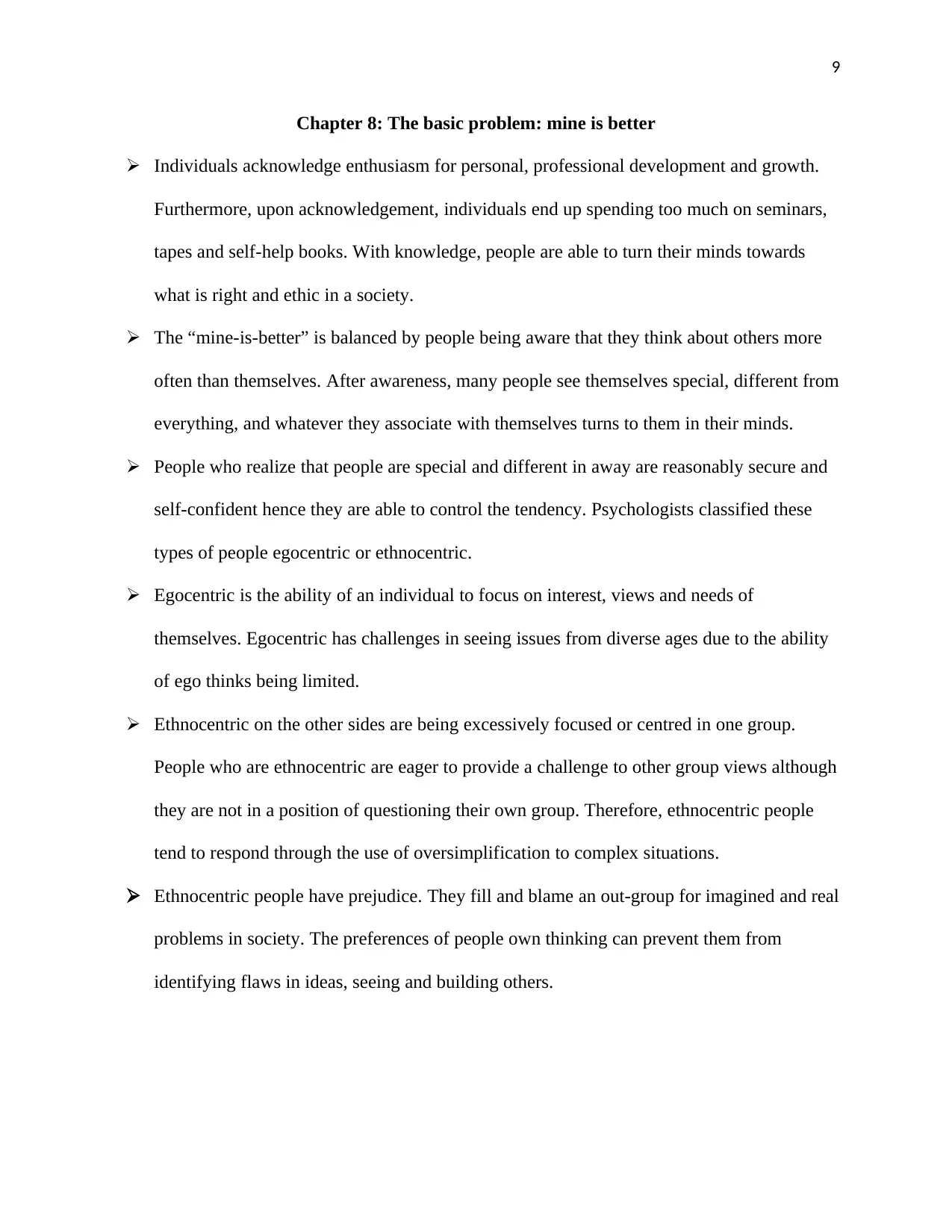
9
Chapter 8: The basic problem: mine is better
Individuals acknowledge enthusiasm for personal, professional development and growth.
Furthermore, upon acknowledgement, individuals end up spending too much on seminars,
tapes and self-help books. With knowledge, people are able to turn their minds towards
what is right and ethic in a society.
The “mine-is-better” is balanced by people being aware that they think about others more
often than themselves. After awareness, many people see themselves special, different from
everything, and whatever they associate with themselves turns to them in their minds.
People who realize that people are special and different in away are reasonably secure and
self-confident hence they are able to control the tendency. Psychologists classified these
types of people egocentric or ethnocentric.
Egocentric is the ability of an individual to focus on interest, views and needs of
themselves. Egocentric has challenges in seeing issues from diverse ages due to the ability
of ego thinks being limited.
Ethnocentric on the other sides are being excessively focused or centred in one group.
People who are ethnocentric are eager to provide a challenge to other group views although
they are not in a position of questioning their own group. Therefore, ethnocentric people
tend to respond through the use of oversimplification to complex situations.
Ethnocentric people have prejudice. They fill and blame an out-group for imagined and real
problems in society. The preferences of people own thinking can prevent them from
identifying flaws in ideas, seeing and building others.
Chapter 8: The basic problem: mine is better
Individuals acknowledge enthusiasm for personal, professional development and growth.
Furthermore, upon acknowledgement, individuals end up spending too much on seminars,
tapes and self-help books. With knowledge, people are able to turn their minds towards
what is right and ethic in a society.
The “mine-is-better” is balanced by people being aware that they think about others more
often than themselves. After awareness, many people see themselves special, different from
everything, and whatever they associate with themselves turns to them in their minds.
People who realize that people are special and different in away are reasonably secure and
self-confident hence they are able to control the tendency. Psychologists classified these
types of people egocentric or ethnocentric.
Egocentric is the ability of an individual to focus on interest, views and needs of
themselves. Egocentric has challenges in seeing issues from diverse ages due to the ability
of ego thinks being limited.
Ethnocentric on the other sides are being excessively focused or centred in one group.
People who are ethnocentric are eager to provide a challenge to other group views although
they are not in a position of questioning their own group. Therefore, ethnocentric people
tend to respond through the use of oversimplification to complex situations.
Ethnocentric people have prejudice. They fill and blame an out-group for imagined and real
problems in society. The preferences of people own thinking can prevent them from
identifying flaws in ideas, seeing and building others.
⊘ This is a preview!⊘
Do you want full access?
Subscribe today to unlock all pages.

Trusted by 1+ million students worldwide
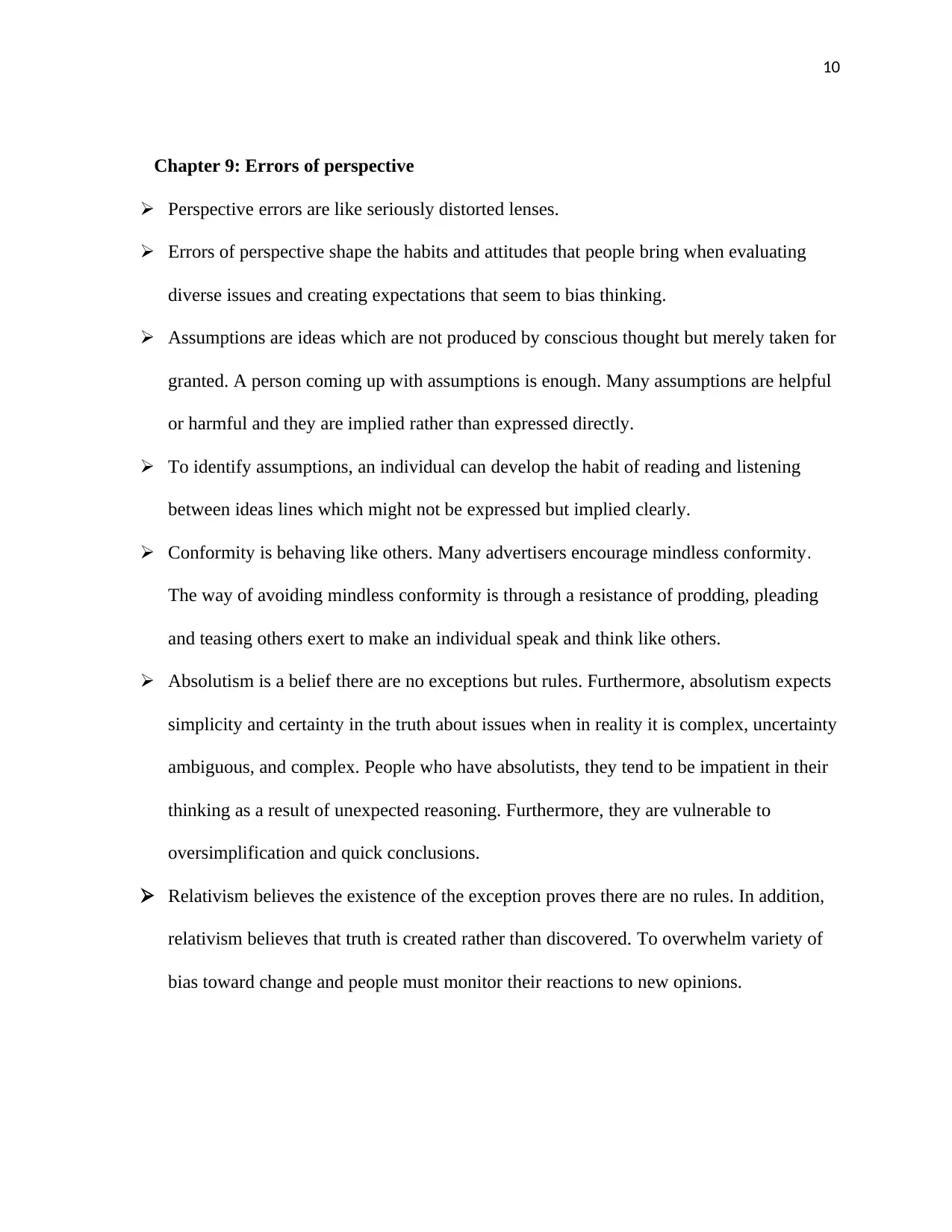
10
Chapter 9: Errors of perspective
Perspective errors are like seriously distorted lenses.
Errors of perspective shape the habits and attitudes that people bring when evaluating
diverse issues and creating expectations that seem to bias thinking.
Assumptions are ideas which are not produced by conscious thought but merely taken for
granted. A person coming up with assumptions is enough. Many assumptions are helpful
or harmful and they are implied rather than expressed directly.
To identify assumptions, an individual can develop the habit of reading and listening
between ideas lines which might not be expressed but implied clearly.
Conformity is behaving like others. Many advertisers encourage mindless conformity.
The way of avoiding mindless conformity is through a resistance of prodding, pleading
and teasing others exert to make an individual speak and think like others.
Absolutism is a belief there are no exceptions but rules. Furthermore, absolutism expects
simplicity and certainty in the truth about issues when in reality it is complex, uncertainty
ambiguous, and complex. People who have absolutists, they tend to be impatient in their
thinking as a result of unexpected reasoning. Furthermore, they are vulnerable to
oversimplification and quick conclusions.
Relativism believes the existence of the exception proves there are no rules. In addition,
relativism believes that truth is created rather than discovered. To overwhelm variety of
bias toward change and people must monitor their reactions to new opinions.
Chapter 9: Errors of perspective
Perspective errors are like seriously distorted lenses.
Errors of perspective shape the habits and attitudes that people bring when evaluating
diverse issues and creating expectations that seem to bias thinking.
Assumptions are ideas which are not produced by conscious thought but merely taken for
granted. A person coming up with assumptions is enough. Many assumptions are helpful
or harmful and they are implied rather than expressed directly.
To identify assumptions, an individual can develop the habit of reading and listening
between ideas lines which might not be expressed but implied clearly.
Conformity is behaving like others. Many advertisers encourage mindless conformity.
The way of avoiding mindless conformity is through a resistance of prodding, pleading
and teasing others exert to make an individual speak and think like others.
Absolutism is a belief there are no exceptions but rules. Furthermore, absolutism expects
simplicity and certainty in the truth about issues when in reality it is complex, uncertainty
ambiguous, and complex. People who have absolutists, they tend to be impatient in their
thinking as a result of unexpected reasoning. Furthermore, they are vulnerable to
oversimplification and quick conclusions.
Relativism believes the existence of the exception proves there are no rules. In addition,
relativism believes that truth is created rather than discovered. To overwhelm variety of
bias toward change and people must monitor their reactions to new opinions.
Paraphrase This Document
Need a fresh take? Get an instant paraphrase of this document with our AI Paraphraser
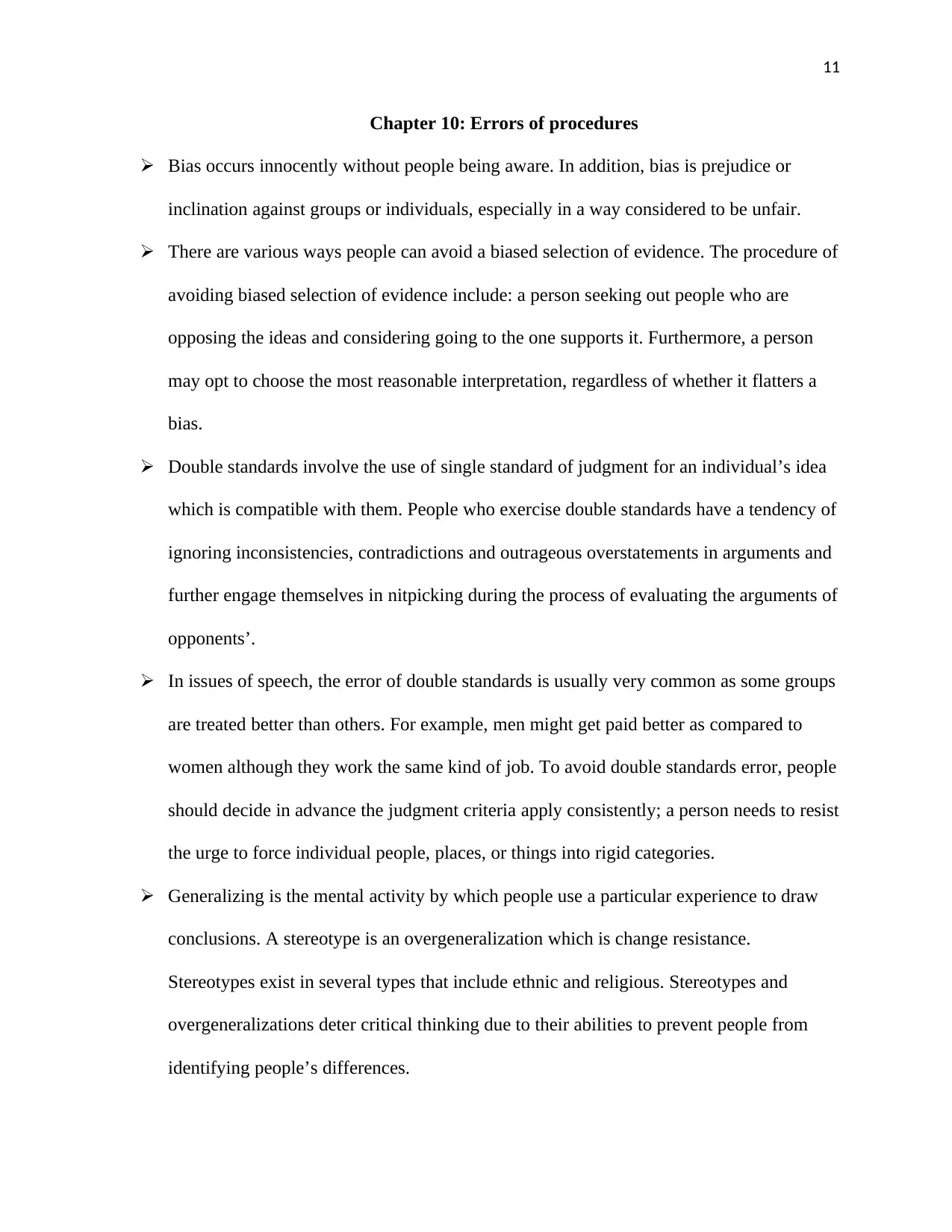
11
Chapter 10: Errors of procedures
Bias occurs innocently without people being aware. In addition, bias is prejudice or
inclination against groups or individuals, especially in a way considered to be unfair.
There are various ways people can avoid a biased selection of evidence. The procedure of
avoiding biased selection of evidence include: a person seeking out people who are
opposing the ideas and considering going to the one supports it. Furthermore, a person
may opt to choose the most reasonable interpretation, regardless of whether it flatters a
bias.
Double standards involve the use of single standard of judgment for an individual’s idea
which is compatible with them. People who exercise double standards have a tendency of
ignoring inconsistencies, contradictions and outrageous overstatements in arguments and
further engage themselves in nitpicking during the process of evaluating the arguments of
opponents’.
In issues of speech, the error of double standards is usually very common as some groups
are treated better than others. For example, men might get paid better as compared to
women although they work the same kind of job. To avoid double standards error, people
should decide in advance the judgment criteria apply consistently; a person needs to resist
the urge to force individual people, places, or things into rigid categories.
Generalizing is the mental activity by which people use a particular experience to draw
conclusions. A stereotype is an overgeneralization which is change resistance.
Stereotypes exist in several types that include ethnic and religious. Stereotypes and
overgeneralizations deter critical thinking due to their abilities to prevent people from
identifying people’s differences.
Chapter 10: Errors of procedures
Bias occurs innocently without people being aware. In addition, bias is prejudice or
inclination against groups or individuals, especially in a way considered to be unfair.
There are various ways people can avoid a biased selection of evidence. The procedure of
avoiding biased selection of evidence include: a person seeking out people who are
opposing the ideas and considering going to the one supports it. Furthermore, a person
may opt to choose the most reasonable interpretation, regardless of whether it flatters a
bias.
Double standards involve the use of single standard of judgment for an individual’s idea
which is compatible with them. People who exercise double standards have a tendency of
ignoring inconsistencies, contradictions and outrageous overstatements in arguments and
further engage themselves in nitpicking during the process of evaluating the arguments of
opponents’.
In issues of speech, the error of double standards is usually very common as some groups
are treated better than others. For example, men might get paid better as compared to
women although they work the same kind of job. To avoid double standards error, people
should decide in advance the judgment criteria apply consistently; a person needs to resist
the urge to force individual people, places, or things into rigid categories.
Generalizing is the mental activity by which people use a particular experience to draw
conclusions. A stereotype is an overgeneralization which is change resistance.
Stereotypes exist in several types that include ethnic and religious. Stereotypes and
overgeneralizations deter critical thinking due to their abilities to prevent people from
identifying people’s differences.
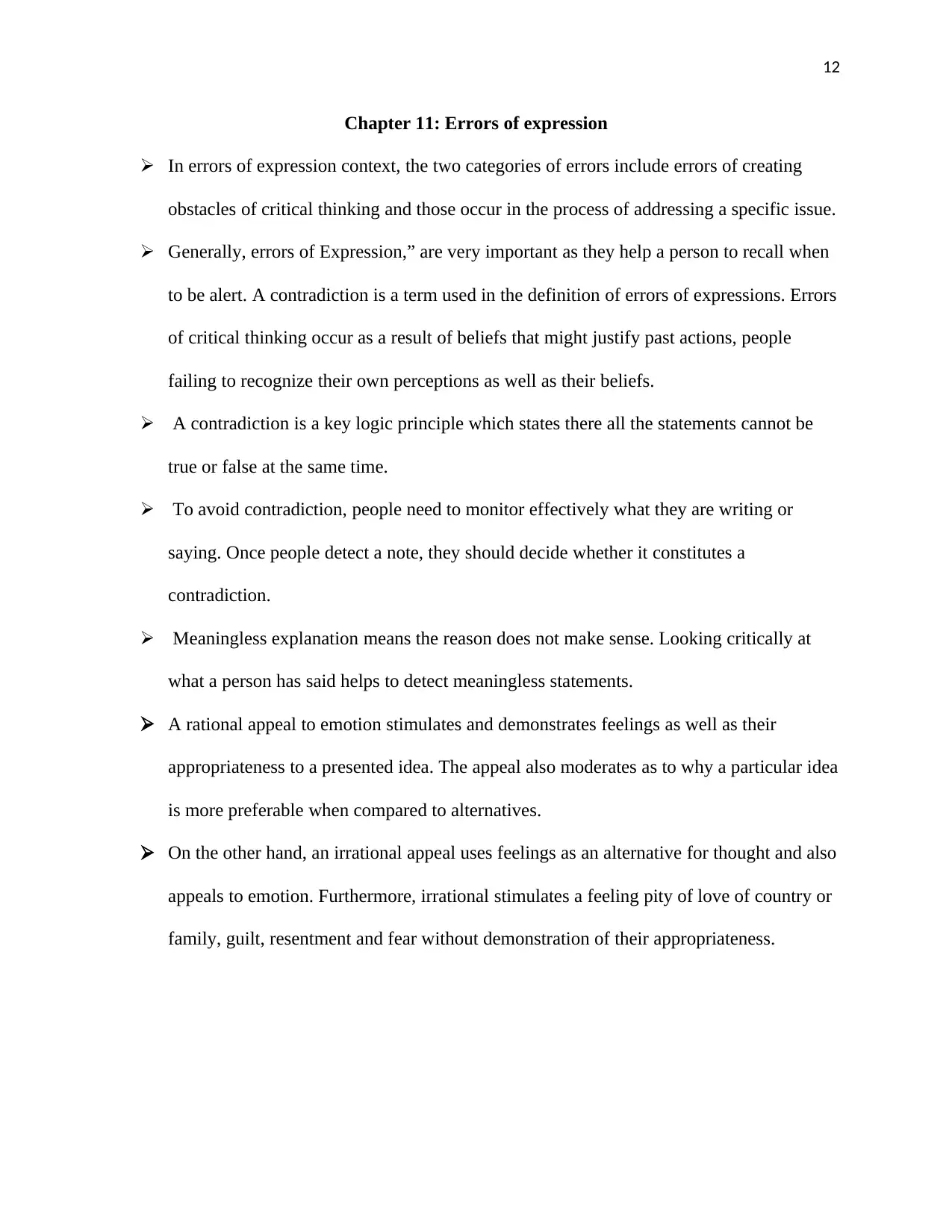
12
Chapter 11: Errors of expression
In errors of expression context, the two categories of errors include errors of creating
obstacles of critical thinking and those occur in the process of addressing a specific issue.
Generally, errors of Expression,” are very important as they help a person to recall when
to be alert. A contradiction is a term used in the definition of errors of expressions. Errors
of critical thinking occur as a result of beliefs that might justify past actions, people
failing to recognize their own perceptions as well as their beliefs.
A contradiction is a key logic principle which states there all the statements cannot be
true or false at the same time.
To avoid contradiction, people need to monitor effectively what they are writing or
saying. Once people detect a note, they should decide whether it constitutes a
contradiction.
Meaningless explanation means the reason does not make sense. Looking critically at
what a person has said helps to detect meaningless statements.
A rational appeal to emotion stimulates and demonstrates feelings as well as their
appropriateness to a presented idea. The appeal also moderates as to why a particular idea
is more preferable when compared to alternatives.
On the other hand, an irrational appeal uses feelings as an alternative for thought and also
appeals to emotion. Furthermore, irrational stimulates a feeling pity of love of country or
family, guilt, resentment and fear without demonstration of their appropriateness.
Chapter 11: Errors of expression
In errors of expression context, the two categories of errors include errors of creating
obstacles of critical thinking and those occur in the process of addressing a specific issue.
Generally, errors of Expression,” are very important as they help a person to recall when
to be alert. A contradiction is a term used in the definition of errors of expressions. Errors
of critical thinking occur as a result of beliefs that might justify past actions, people
failing to recognize their own perceptions as well as their beliefs.
A contradiction is a key logic principle which states there all the statements cannot be
true or false at the same time.
To avoid contradiction, people need to monitor effectively what they are writing or
saying. Once people detect a note, they should decide whether it constitutes a
contradiction.
Meaningless explanation means the reason does not make sense. Looking critically at
what a person has said helps to detect meaningless statements.
A rational appeal to emotion stimulates and demonstrates feelings as well as their
appropriateness to a presented idea. The appeal also moderates as to why a particular idea
is more preferable when compared to alternatives.
On the other hand, an irrational appeal uses feelings as an alternative for thought and also
appeals to emotion. Furthermore, irrational stimulates a feeling pity of love of country or
family, guilt, resentment and fear without demonstration of their appropriateness.
⊘ This is a preview!⊘
Do you want full access?
Subscribe today to unlock all pages.

Trusted by 1+ million students worldwide
1 out of 21
Related Documents
Your All-in-One AI-Powered Toolkit for Academic Success.
+13062052269
info@desklib.com
Available 24*7 on WhatsApp / Email
![[object Object]](/_next/static/media/star-bottom.7253800d.svg)
Unlock your academic potential
Copyright © 2020–2026 A2Z Services. All Rights Reserved. Developed and managed by ZUCOL.





